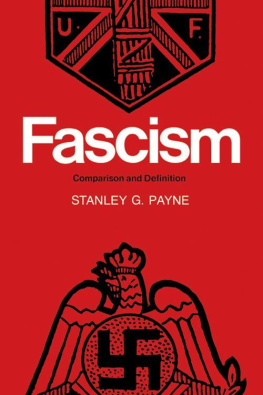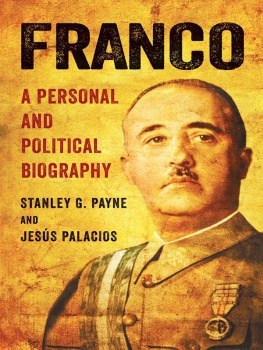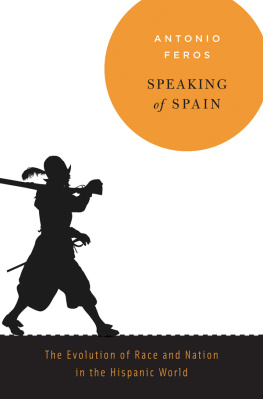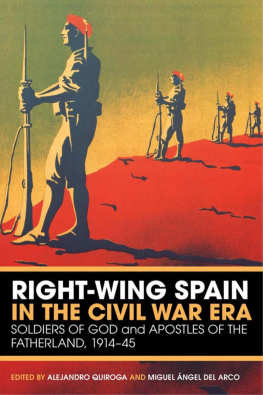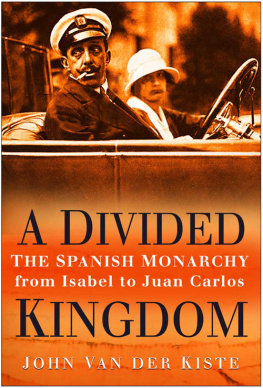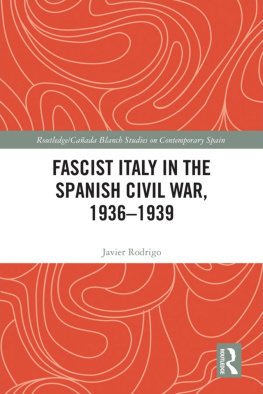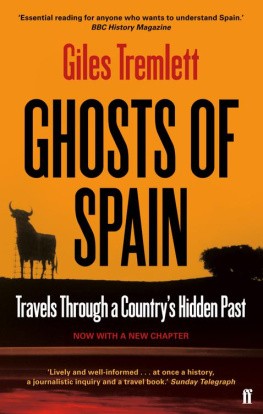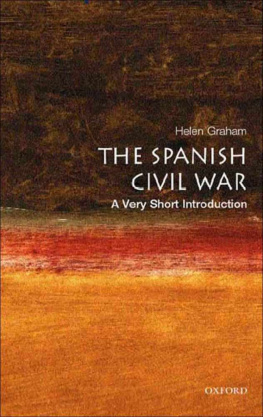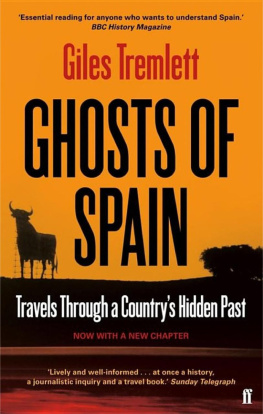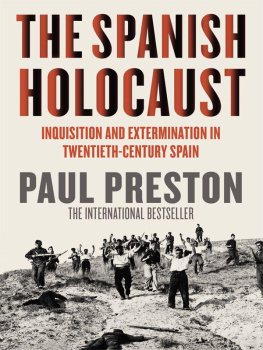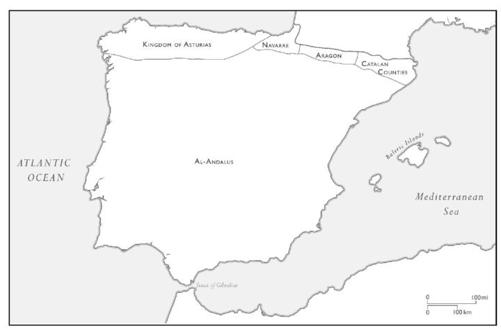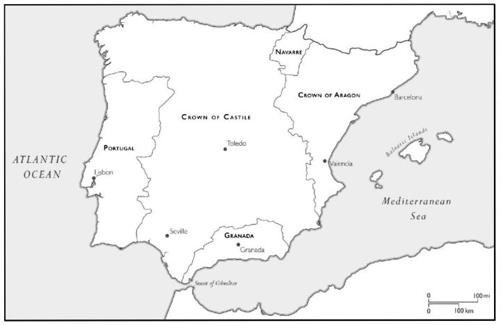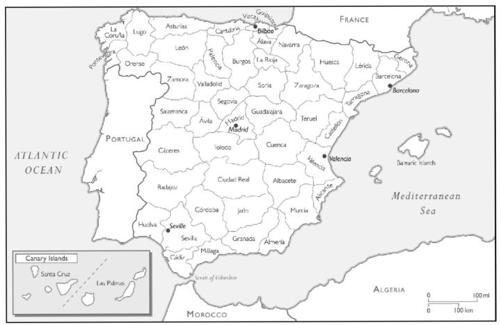Provincial divisions of modern Spain
Abbreviations
| ARMH | Asociacin para la Recuperacin de la Memoria Histrica (Association for the Recovery of Historical Memory)
|
| BOC | Bloque Obrero y Campesino (Workers and Peasants Bloc) |
| CEDA | Confederacin Espaola de Derechas Autnomas (Spanish Confederation of Autonomous Rightist Groups) |
| CNT | Confederacin Nacional del Trabajo (National Confederation of Labor) |
| ETA | Euskadi Ta Askatasuna (Basque Homeland and Freedom) |
| FAI | Federacin Anarquista Ibrica (Iberian Anarchist Federation) |
| FET | Falange Espaola Tradicionalista (later Moviento Nacional) |
| ICGP | International Conference Group on Portugal |
| INI | Instituto Nacional de Industria (National Institute of Industry) |
| JSU | Juventudes Socialistas Unificadas (United Socialist Youth) |
| NDH | Independent State of Croatia |
| ORGA | Organizacin Regional Gallega Autnoma (Autonomous Regional Organization of Galicia) |
| PCE | Patido Comunista de Espaa (Communist Party of Spain) |
| PNV | Partido Nacionalista Vasco (Basque Nationalist Party) |
| POUM | Partido Obrero de Unificacin Marxista (Workers' Party of Marxist Unification) |
| PSOE | Partido Socialista Obrero Espaol (Spanish Socialist Workers' Party) |
| PSUC | Partit Socialista Unificat de Catalunya (United Socialist Party of Catalonia) |
| SSPHS | Society for Spanish and Portuguese Historical Studies |
| UCD | Unin de Centro Democrtico (Union of Democratic Center) |
Introduction
The Image of Spain
All history is specific and singular, and therefore in key respects unique. Though certain similarities may be observed, all history is also in some sense "different," just as all human beings have many things in common yet in every case remain different individuals. At a certain level of comparison and abstraction many common factors and characteristics maybe identified in the histories of diverse countries, yet the history of every land also remains individual and in important ways different from all others.
Some histories have seemed more singular, more different from the supposed norm, than others, and in western Europe the history of Spain has for several centuries been considered the most unique. What has often been called "the problem of Spain" first emerged in the seventeenth century with the decline in military and economic power, accompanied by an early failure in "modernization," even though issues of unity and stability were resolved in terms of maintaining the status quo. After the great work of Juan de Mariana was published in 1602, Spaniards virtually ceased to write general histories of Spain, an activity that became increasingly the work of French and British authors during the eighteenth century. Foreign historians tended to see Spain's history as different from the supposed western European norm and also as problematic. Although the nationalist historiography of the nineteenth and twentieth centuries claimed to resolve the problems, many have not agreed. Claudio Snchez Albornoz, for example, was one of the greatest Spanish medievalists during the twentieth century. He lived half his life as a Republican migr in Buenos Aires, but he was also a practicing Catholic and ardent Spanish patriot. When he published a massive two-volume interpretation of his nation's history in 1956, he titled it Espaa, un enigma histrico.
Attitudes toward major aspects of Spanish history have generally been more negative and critical than to any other west European country. This begins with the evaluation of the Visigoths, often seen as divided, inept, and quickly decadent. The medieval kingdoms have been viewed as peripheral and backward, the Reconquest as dubious, conflictive, and long delayed. While the relative tolerance of a large and thriving Jewish community in the Middle Ages might have earned Spain good marks, the Inquisition and the subsequent expulsion brought opprobrium. The use of Habsburg military power and the terms of the conquest of America generated widespread criticism, while the seventeenth-century decline was soon seen as the most classic case of "decadence" since the fall of Rome. From that time on Spain has been viewed in varying ways as a special "problem," defined in varying terms-and sometimes with regard to quite different issues-from the seventeenth century to the present.
This was less the case during the Middle Ages when Spain was perceived as a normal and regular, if geographically peripheral, part of Latin Christendom. The popularity of the pilgrimage to Santiago de Compostela rivaled that of Rome, while the struggle against the Muslims sometimes took an international character, as foreign crusaders and adventurers intermittently flocked to the peninsula. In the later Middle Ages Italian merchants increasingly found commerce and finance in Spain to be lucrative, while the crowns of Aragon and Castile played normal roles in the west Mediterranean and west European international systems.
The sixteenth century was characterized by a growth in Spanish prestige, somewhat counterbalanced by the steep rise in criticism and denunciation that Julin Juderas would baptize four centuries later as the Black Legend. Diplomatic and military prestige was very high, soon to be accompanied by cultural influence. Castilian became an international language, and by the beginning of the seventeenth century Spanish literature was widely read abroad, either in Castilian or in translation. Spain was a religious leader as well, along with Italy playing one of the dominant roles in the Counter-Reformation. Classic Spanish religious writings in theology and philosophy, such as those of Francisco Surez or Luis de Granada, would sometimes be read extensively, even in Protestant countries, into the eighteenth century.


